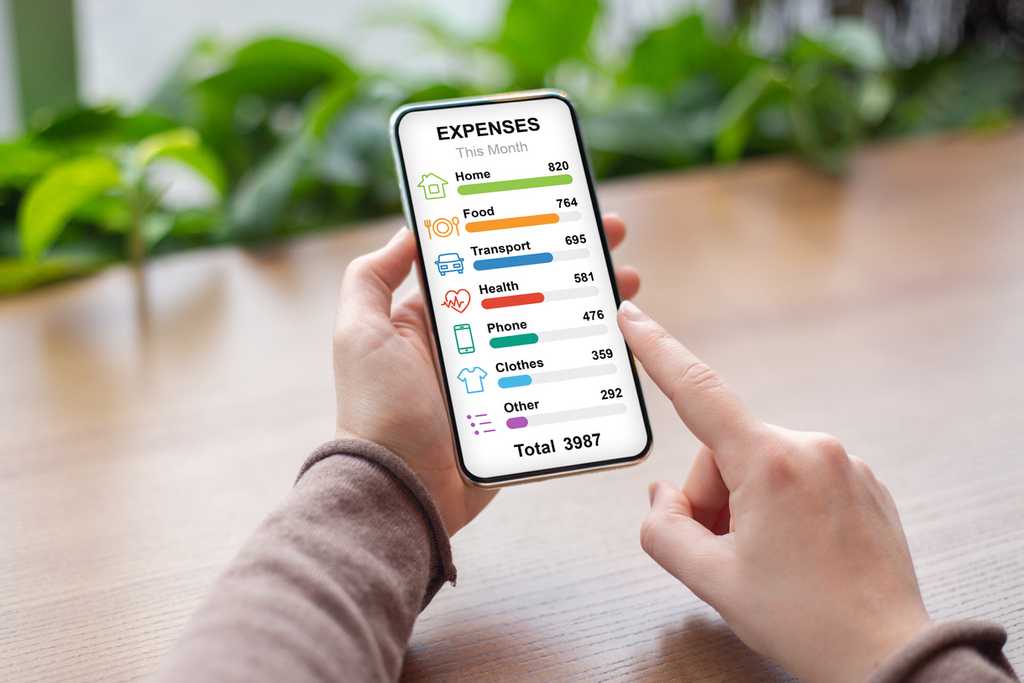If you want to create and stick to a budget, a budgeting app might be helpful to you. While you can track your budget with a spreadsheet or on paper, it can be time-consuming and not give you a complete picture of your financial situation.
Budgeting apps can help you track your personal finances, including expenses, money earned, loans, or savings. Depending on the brand, you can access most budgeting apps from your phone, computer, or tablet. Some budgeting apps sync with your financial accounts, while others allow you to input information manually.
Best Budgeting Apps
| Brand | Cost | Apple/Google Rating | Free Trial | Best For |
|---|---|---|---|---|
Free | Apple: 4.8 Stars Google: 4.3 Stars | N/A | Tracking your credit score | |
Free option or Bill Negotiation version for 15% of annual savings | N/A; Currently only available on desktop | No free trial for the paid version | Medical bill and bank negotiations | |
Free option, Premium option for $3-$12 per month, or Bill Negotiation version for 30%-60% of the amount you save during the first year. | Apple: 4.4 Stars Google: 4.3 Stars | No free trial for the paid version | Managing and canceling bills and subscriptions | |
$99 annually or $14.99 per month | Apple: 4.8 Stars Google: 4.1 Stars | Free trial for 34 days | Budgeting across multiple platforms | |
Free option or Premium option for $8.33 per month or $99.99 per year | Apple: 4.8 Stars Google: 4.2 Stars | Free trial for 7 days | Couples sharing finances | |
Free option or $7.99 per month, $34.99 annually, or $79.99 one-time fee for a lifetime subscription | Apple: 4.7 Stars Google: 4.4 Stars | Free version available | Tracking spending | |
Free | Apple: 4.7 Stars Google: 4.3 Stars | N/A | Investment tracking | |
$10 per month or $100 per year; $70 for the first year | N/A; Currently only available on desktop | 14 day free trial | Crypto |
Mint
Mint is one of the most popular budgeting apps available, with over 25 million users, but its shutting down on March 23, 2024, making a lot of their users look for a good alternative for mint, The free app offers several features, most notably the ability to sync your bank accounts and credit cards. Mint also provides bill payment tracking, budget goal tracking, credit score tracking, budget alerts, payment reminders, the ability to categorize your bank transactions, and investment tracking.
Mint participates in security scanning with VeriSign and uses multi-factor authentication and touch ID mobile access.
| Pros | Cons |
|---|---|
Free | Advertisements within the app |
Offers credit score tracking | Some users report connectivity issues |
Syncs to your bank accounts and credit cards | Limited customer service |
You can set alerts for things like ATM fees, when you are over budget, etc. | |
Bill payment reminders |
Trim
Trim is a smaller desktop-only budgeting option with just over 2 million users. One of Trim's most significant benefits is having it negotiate your medical bills on your behalf, though you will be charged a fee of 15% of your annual bill savings. Trim also offers the ability to track spending, monitor and cancel unwanted subscriptions, and negotiate for lower cable, phone, and internet bills.
Trim uses bank-level security, with 256-bit SSL encryption on its website and encrypted databases. They also have two-factor authentication.
| Pros | Cons |
|---|---|
Negotiates bills on your behalf, including medical bills | No mobile access |
Monitors and cancels unwanted subscriptions |
Rocket Money
Rocket Money has over 3 million users and boasts features like the ability to view all your subscriptions on one screen, financial monitoring, account alerts, and bill negotiation. Rocket Money also has a Premium subscription, which includes additional features like automated subscription cancellations, smart savings, and overdraft and late fee refunds.
Rocket Money uses bank-level 256-bit encryption, and its servers are hosted on Amazon Web Services (AWS). Rocket Money smart savings accounts are FDIC-insured.
| Pros | Cons |
|---|---|
Flexible pricing available | Many of the features are only available through paid Premium subscription |
Cancels unwanted subscriptions | Charges a 30-60% savings fee on successfully negotiated bills |
Offers cell phone, cable, and security bill negotiation |
You Need a Budget (YNAB)
You Need a Budget (YNAB) offers a proactive budgeting approach rather than tracking what you have already spent. The app provides educational resources like video courses, live workshops, and guides.
YNAB syncs to your bank accounts and credit cards and allows you to set goals and customize your spending categories. However, it is one of the pricier options on our list, at $99 per year. There is no free option after the 34-day free trial. You can get a free 365-day trial if you are a college student.
| Pros | Cons |
|---|---|
Education resources for a proactive budgeting approach | No free option after the free trial |
Designed to help you get out of debt | No investment tracking |
Syncs to bank accounts and credit cards |
Monarch Money
Monarch Money currently connects with over 11,000 banks and institutions, letting you track your real estate investments, bank accounts, credit cards, investments, and loans to see your net worth progress over time. Plus, you can manually add valuables like art to your portfolio.
Monarch Money makes it easy for couples to collaborate on an account, which is a feature that few budgeting apps have. It uses Plaid for data aggregation and offers multi-factor authentication for account logins.
| Pros | Cons |
|---|---|
Track your real estate property values automatically through Zillow | Doesn’t support bill payments |
Connects with over 11,000 financial institutions | Limited features in the free version |
Comprehensive net worth tracker | |
Easy for couples to collaborate on an account |
PocketGuard
PocketGuard is an app especially suited for overspenders. It allows you to track your income, expenses, and savings to help prevent spending more than necessary. The app also offers smart bill reminders and automated savings features.
PocketGuard uses 256-bit encryption, a four-digit PIN, Touch ID, and Face ID.
| Pros | Cons |
|---|---|
Personalized reports on your spending | Some users have reported syncing issues |
Smart bill reminder |
Personal Capital
With over 3 million users. Personal Capital syncs to your bank accounts, credit cards, and other financial accounts. The app offers useful investing tools, like a Retirement Planner and Education Planner.
Personal Capital uses data encryption, fraud protection, and strong user authentication to keep your account safe.
| Pros | Cons |
|---|---|
Offers investing tools, like a Retirement Planner tool and Education Planner tool | Less focused on budgeting |
Free | No option to manually add transactions for budgeting |
Provides net worth tracking |
Lunch Money
Lunch Money is one of the lesser-known budgeting apps. Still, it offers some unique features, like the ability to connect to your crypto wallets and ledgers. Lunch Money allows you to import directly from your banks and manually upload transactions.
Lunch Money uses two-factor authentication and bank-level security with 256-bit SSL encryption. File attachments are two-layer encrypted and stored in Google Cloud Storage.
| Pros | Cons |
|---|---|
Connect to crypto wallets and ledgers | No mobile access |
Run queries to get insight into your spending habits | |
Invite collaborators to your budget |
Methodology
To create a list of the best budgeting apps, we looked at some of the highest-rated apps on the market. We reviewed factors like cost, user reviews, whether the app has a free trial, and platform features.
When looking at the app’s features, we looked at features like the ability to sync with multiple financial institutions, budgeting analysis, and net worth tracking, among many others. We only considered apps that are free, offer a free version, or offer a free trial.
How to choose a budgeting app
When choosing a budgeting app, you should first think about what you most want to get out of it. Do you need help tracking your investments? Do you want to know what types of things you spend most of your money on? Do you want to track your loan repayment progress?
Different apps have different features, so making a list of what you want to be included in the app will help you narrow it down. Some apps have features like automated savings, alerts when it’s time to pay your bills, and even suggestions on how to save money.
It’s also crucial that you make sure the app is safe. Most apps have data protection features, and if you look at an app with a savings component, the account should be FDIC-insured.
You should also consider whether or not you’re willing to pay for an app. Some apps provide a free version or a paid version with additional features. There are pros and cons to both free and paid budgeting apps. Sometimes the benefits you get from a subscription-based budgeting app can be worth the cost, and often, many of these paid apps let you try it for free for a certain period.
Why should you use a budgeting app?
Budgeting can be overwhelming, intimidating, and time-consuming, but budgeting apps can help automate some processes, saving you time and frustration. Budgeting apps can also help you look at your spending and saving habits and make recommendations for improvement.
FAQ
What do budgeting apps do?
Budgeting apps can help you track your personal finances, including expenses, money earned, loans, or savings. Budgeting apps can also help you look at your spending and saving habits and make recommendations for improvement. Different budgeting apps will have varying features.
How Much Does a Budgeting App Cost?
Budgeting apps have various costs, ranging from free to over one hundred dollars a year. Some apps offer a free and paid version with additional features.
There are pros and cons to free and paid budgeting apps. Sometimes the benefits you get from a subscription-based budgeting app can be worth the cost. Some paid subscription-based budgeting apps let you try out the app for free for a certain period.
Are budgeting apps safe?
You should always do your research to make sure that the budgeting app you are using is safe. Most apps have data protection features, and if you look at an app with a savings component, the account should be FDIC-insured.
What is the best budgeting app?
The best budgeting app will vary from person to person. You can choose a budgeting app that is best for you based on the features you want, how much you want to spend on the app, and what you want to get out of the app.

